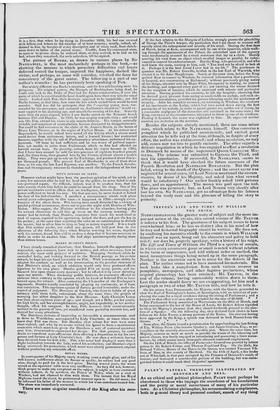TREVOR'S LIFE AND TIMES OF WILLIAM THE THIRD.
NOTWITHSTANDING the greater unity of subject and the more im- portant nature of the events, this second volume of Mr. TREVOR. is inferior to his first. The greatness of his subject seems to have overwhelmed him; or he has no distinct idea in his mind of how history and historical biography should be written. He does not, by confining his narrative chiefly to the events in which WILLIAM. himself was an agent, bring out his character and policy in bold relief; nor does he, properly speaking, write a history of his reign. The Life and 7'imes of William the Third is a species of annals,. in which every occurrence great or small is noted without relation to its value or importance, and told without order or method, the most incongruous things being mixed up in the same paragraph. Neither is the execution such as to atone for the defects of the plan. The author seems not to have mastered his materials. His book looks like a _compilation from such various sources as pamphlets, newspapers, and other fugitive productions, whose original phraseology has been retained; Mr. TREVOR, in the rest of the volume, having successfully written down to them. Lest the reader should fancy we are exaggerating, let him read a paragraph or two of what Mr. Tasvolt tells, and how lie tells it.
On his return from Portsmouth, his Majesty, with the Queen, proceeded to view the Earl of Nottitighain'a house, at Kensington, with an intention of pur- chasing the same for a royal residence (luring the sitting of Parliament ; and a bargain to that effect was soon after concluded for the SUM of 20,0001. • • The Parliament being assembled at Westminster on the 20th of March, and being summoned to the bar of the House of Lords, Sir Robert Atkins signified to them his Majesty's pleasure that they ahould forthwith proceed to the elec- tion of a Speaker. On the following day, they declared their choice to have fallen on Sir John Trevor, a strong partisan of the Tories. his election having been approved by the King, a speech was delivered to both houses from the
throne. • „ • • * Soon after, the Queen issued a proclamation for apprehending the late Bishop of Ely, William Penn (the famous Quaker), and James Gtaliam, Esq., as ac- complices in the recently-discovered Jacobite plot. 'About the same time, her Majesty, anxious to meet as much as possible the wants of the labouring and pourer classes, was busily engaged in introducing and promoting a linen manu- facture, by which means many thousands obtained continued employment.
On the 11th of March, the office of Postmaster-General was granted by letters patent to Sir Robert Cotton arid Thomas Frankland Esq. On the 25th, Sir Edward Villiers, Master of the Horse to the Queen, was created Viscount Vil- liers, of Hoo, in the county of Het tford. On the I I th of April, a fire broke out at Whitehall, in that part occupied by the Princess of Deumaik's maids of honour, and destroyed a considerable portion of the building, but was extin- guished before it could reach their Majesties' apartments.


























 Previous page
Previous page